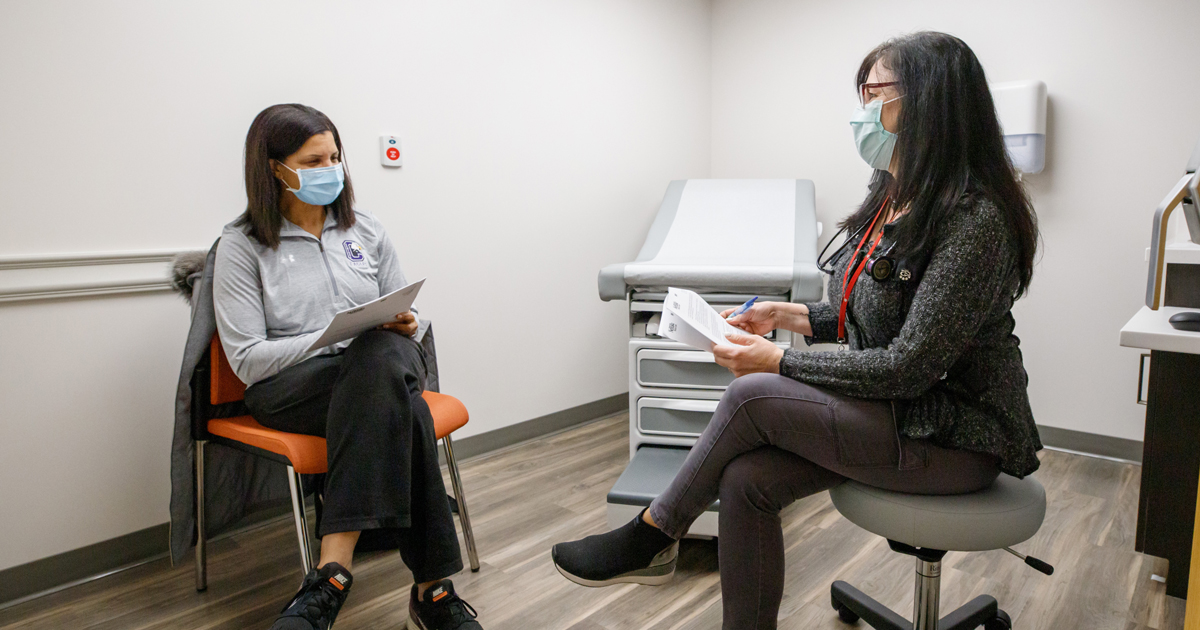The new Novavax COVID vaccine: Why it’s different and when you can get it

The Food and Drug Administration and Centers for Disease Control and Prevention have authorized Novavax COVID-19 vaccine for emergency use.
Infectious diseases expert Richard Starlin, MD, is glad for a fourth option protecting against COVID-19. “It’s terrific news that there’s another vaccine available.” Instead of an mRNA vaccine (Pfizer, Moderna) or a viral vector vaccine (Johnson & Johnson), Novavax is a more traditional protein vaccine.
How Novavax vaccine works (and how’s it’s different)
“Novavax uses a different technology than the other vaccines – instead of mRNA or adenovirus, it’s an older, more traditional approach,” says Dr. Starlin. “Novavax contains proteins with an adjuvant. The adjuvant stirs up the immune system to have a more profound response.”
“The immune response is still geared toward the spike protein,” says Dr. Starlin. “The vaccine just uses a different technology to get that same response.”
Find out how Novavax used moth cells to create the vaccine proteins.
Can Novavax cause myocarditis?
The most commonly reported side effects after getting the Novavax vaccine include pain/tenderness, redness and swelling at the injection site, fatigue, muscle pain, headache, joint pain, nausea and fever.
Myocarditis – an inflammation of the heart muscle – can happen after getting the Novavax vaccine, but it’s rare. In the clinical trial of over 40,000 vaccine recipients, there were four participants who experienced myocarditis after vaccination. In most people, symptoms (listed below) began within 10 days.
Get medical attention if you have any of these symptoms after vaccination:
- Chest pain
- Shortness of breath
- Feelings of having a fast beating, fluttering or pounding heart
“COVID-19 illness is much more likely to cause myocarditis and pericarditis than vaccination,” says Dr. Starlin. Myocarditis caused by COVID-19 also tends to be much more severe than myocarditis after vaccination.
Results of the phase 3 clinical trial
Against the alpha (B.1.1.7) and beta (B.1.351) variants, plus other variants of concern/variants of interest, Novavax had 93% efficacy in the phase 3 clinical trial.
However, the study was done before omicron variants, including BA.4 and BA.5, were out yet. “The clinical trials tested the Novavax vaccine with older variants, since the trials were completed a while ago,” explains Dr. Starlin. “So, we don’t have data on how it performs against the latest omicron variants. However, we do know that people who are fully immunized and up to date have less severe cases and lower risk of hospitalizations.”
Why did Novavax take so long to get authorized?
Ultimately, manufacturing issues and supply shortages caused delays.
Infectious diseases expert Diana Florescu, MD, and research coordinator Natasha Wilson, APRN, FNP-C, led the phase 3 clinical trial of the Novavax vaccine. “We’re really excited that Novavax is now authorized for use,” says Wilson.
Their University of Nebraska Medical Center team was one of 113 sites in the United States.
“The trial itself was a lot of work, because the pandemic changed some things along the way,” explains Wilson. The study was amended to give participants who had previously just received a placebo (no vaccine) to get the active Novavax vaccine once Pfizer had been authorized. And later, when boosters were recommended, the trial was amended again.
The delay was not at all due to a lack of interest. “The study enrolled 30,000 participants across the United States in less than two months,” says Wilson. “It was a fast and furious trial.”
“People were so enthusiastic to participate,” says Dr. Florescu. “One family included every family member in the trial. Grandparents, parents and children – all three generations – took part in it.” The UNMC team renovated a clinic specifically for the trial and hired staff to manage it.
Thirteen percent of participants were older than 65, a high-risk age group for severe COVID-19.
The trial also included people from multiple backgrounds:
- 20% Latino/Latina
- 12% African American
- 7% Native American
- 5% Asian American
Can Novavax be used as a booster shot? And can it be mixed with Pfizer or Moderna?
Novavax was authorized as a primary series – meaning, it’s for people who are not vaccinated against COVID-19. It’s possible Novavax may be authorized as a booster in the future if studies show the safety and efficacy of doing so.
As of today, Novavax can’t be mixed with Pfizer or Moderna. “Your primary series should be the same vaccine for both doses,” says Dr. Starlin.
When Novavax is available in the US
Unvaccinated people who are 18 years and older can get the two-dose primary series, taken three weeks apart.
The federal government has purchased 3.2 million doses of the Novavax COVID-19 vaccine – making it free to everyone.
However, there will be a limited supply, and it won’t be available everywhere.
Two Nebraska Medicine pharmacy locations received their first shipment of the Novavax vaccine for COVID-19. Patients can now receive the vaccine on a walk-in basis at Pharmacy at Lauritzen Outpatient Center and University Health Center at University of Nebraska – Lincoln.
Keep an eye on NebraskaMed.com/Vaccine for updates.





